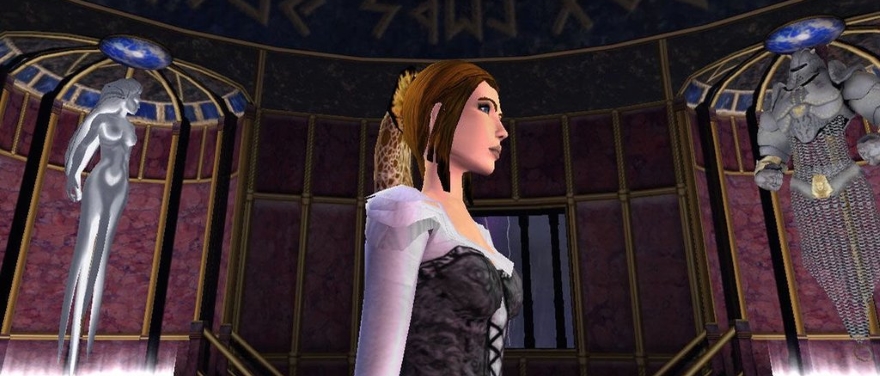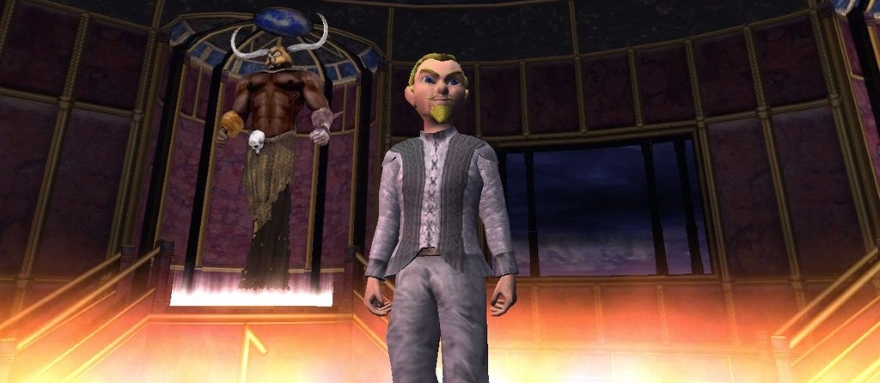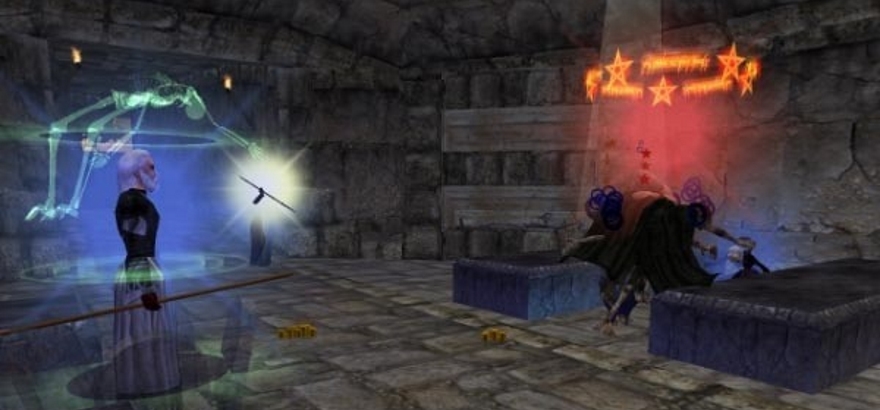
First of all, “wish” is one of those words that ends up looking dang strange the more you focus on it. Wish, wish, wish, wish. It’s just a bunch of meaningless lines and squiggles to me now.
Anyway, what’s up for today’s topic? We’re going to look at another MMO that didn’t make it to the starting gate even with some genuine enthusiasm and hype surrounding it, and that game is wrrrshhsish. Wish. That game is Wish.
While memories of this never-launched title have faded with time, Wish is still remembered for two things: a truly audacious feature set that promised the world and an abrupt, bizarre end that seemed to come out of nowhere. What made this MMO so special and why did it die so young? Our very own Game Archaeologist is on the scene with a special report.
You get only one “wish” pun, so you’d better make it good
Wish seemed to arrive as rapidly as it would later disappear. Mutable Realms, a studio that formed in 2001, began work on Wish in 2003 and announced it as well as the start of the first beta test to the world in January 2004. It was small fry compared to the budgets over at SOE and Blizzard, but the Mutable Realms team seemed determined to make a name for itself with Wish. The devs even coined an awkward new acronym for the game: UMMORPG, or “Ultra Massive Multiplayer Online RPG.”
In what sounds like an eerie precedent to claims made by more recent MMOs, Wish was to be a game that would toss out levels and produce truly dynamic content that would forever alter the game world. And oh yeah, everyone in the game would play on a single server.
The game debuted to the public at E3 in May of 2004, receiving generally positive if not comprehensive press coverage. Massively OP was not there because someone had yet to invent Massively OP, so that’s our excuse.
By several accounts, Wish grew in beta testing size and popularity, becoming one of the more anticipated MMOs of the time. As the closed beta test wrapped up, the larger community looked forward to the start of the open beta on December 1st, 2004. However, Mutable Realms announced a one-month delay while the team worked on bugs, pushing beta 2.0 to January 1st, 2005 instead.
And then it happened. Ten days and 60,000-plus beta testers later, Mutable Realms posted a letter stating that the game was to be shut down, and the studio made good on its promise mere hours later.
So what happened? That’s an excellent question that we’re going to shelve for a moment while we look at what made Wish so unique.
Big ideas for a big world
Eschewing the MMO design of the time in both sandbox and themepark games, the Mutable Realms team wanted to take Wish in the direction of the industry’s pen-and-paper forefathers by bringing back the role of the hands-on game master.
In Wish, the quests wouldn’t be set in stone and available in a website’s database somewhere. Instead, the devs created a powerful set of tools that would allow them to create complex and interesting quests within minutes and then drop them right into the game world. Some quests could be given out by criers or other NPCs, but the team of around 20 GMs had the main responsibility of going into the game personally to deliver missions to players.
Between this and the promise that the game world could be forever altered through quest events, it’s easy to see the strong appeal that Wish exuded. It wouldn’t be the same MMO a week later, but would constantly offer up new challenges and new stories faster than players could complete them. Wandering heroes would encounter dynamic spawns that would trigger off of their level and the surrounding environment. True heroes could even be immortalized in a bard’s song or a bronze statue on a battlefield somewhere.
The big ideas didn’t stop there, either. Wish was created to run on a ZeroC’s scalable network engine, also created by Mutable Realms, which would plunk everyone on a single server in order to make a unified, non-instanced world. The team claimed that the tech was so good that it could actually be played with a modem (remember those?).
However, to push the concurrency limits into the 50-100K range, the devs had to make some design sacrifices. Movement was limited to point-and-click, although players claimed the pathing was well-done. And combat had no auto-attack but required continual key presses to fight.
Players had a wide range of freedom with their characters, as Wish mostly eschewed traditional classes in favor for a skill-based system. A flatter-than-normal character power curve put more of an emphasis on apprenticing to NPCs for skills and gradually training up. In an interesting twist hearkening back to the days of Ultima Online, skills could degrade over time if not used, although there was some talk of a “skill lock” so that this didn’t happen constantly.
Naughty boys and girls were also catered to in Wish, with a robust thieving system that tasked players to roleplay real thieves by breaking into houses and robbing NPCs. Of course, such actions required consequences, and the worst of the thieves might find themselves with bounties on their heads.
The day of days
So Wish certainly sounded promising, even if it looked a little graphically rough and probably fell into the same trap of talking big but delivering a little less-than-big. So why did Mutable Realms decide to can the entire project and fold up the company on January 10th, 2004?
The official statement on the studio’s website wasn’t of much help:
After careful consideration of all the facts and analyzing all the data which we have gathered from the Wish beta 2.0 test so far, we have decided to cancel the Wish project.
We enjoyed working together with our fans very much, and we are very sorry about this development. We wish you the best of luck in the future, and hope that you continue to enjoy online gaming, even with Mutable Realms and Wish not being available anymore.
We also wish the best luck to our competitors, and hope that they will not suffer the same fate as us.
What threw everyone for a loop is that Wish appeared to be doing just fine. It had a respectable 60,000 players 10 days into the open beta and no real red flags giving warning as to imminent doom. Mutable Realms’ only other official statement was sent to fan sites, where the studio explained, “Even with the most optimistic projections, we could not possibly get enough subscribers for Wish so that it could sustain itself.”
So maybe that’s it. Maybe it was popular, just not popular enough, and the bean counters ran the numbers and figured that everyone would be irreversibly broke before the game turned a profit. However, it’s an explanation that not many people accept.
Many players were bewildered at the abrupt shutdown, including Heath Hindman at RPGamer, who stated, “The fact is there were no insurmountable problems blocking Wish’s path to success.”
Gamespy joined in on the guessing game: “Speculation has it that the beta test revealed some critical flaw(s), whether it be technological or financial, which resulted in terminating the project, and the folding of Mutable Realms as a developer.”
Game Designer Ryan Shwayder added his two cents: “It seems like it is pretty late in development to be canning a project. It was, apparently, in the second phase of public beta when they decided to kill it. Do projects need to be assessed earlier in the development cycle for nuking? In my opinion, a game that isn’t going to come out should never actually reach beta testing.”
Some jeers went with the tears. GU Comics poked fun at Wish’s rapid rise and fall in a one-panel, going on to observe, “To say it was sudden and unexpected is an understatement. With over 68,000 beta applicants and 30,000 active player accounts, the game seemed to be getting off on the right foot. But from a community standpoint, the game and its beta went largely unnoticed. And maybe that was a key factor in deciding to shut the game down before it dug deeper into the investors’ pockets.”
About.com’s Dave Spohn was in the beta and tried to figure it out without success: “Although there were a few issues that needed to be addressed, they really didn’t strike me as anything that would warrant abandoning the project entirely. I was hoping that Wish would carve out a niche for itself among the mammoth MMORPGs that rule the day. Unfortunately, it now serves as yet another indication of just how difficult it is for a small company with a limited budget to be competitive in this genre.”
Lead Designer Dana Massey wrote a post-mortem that illuminated some of the issues that were going on behind the scenes, starting with the fact that its small team was very much in over its head.
“Wish had no single cause of death, but overhype played a huge role,” Massey wrote. “Our statistics didn’t lie. At every step of the way, from signing up for beta, to downloading and installing the client, to playing the game for more than an hour, we lost huge percentages of players. In case we didn’t trust the stats, tons of players told us about their departure on our forums, as well.”
The “what if it had launched?” is fun to tug at, although I do agree that it probably would have been a much smaller title and had difficulties living up to its promises. In the end, Wish’s assets were carved up and sold off, with some being used for Irth Online. And with that, it’s good night children. Turn off the light and get tucked into bed.
 Believe it or not, MMOs did exist prior to World of Warcraft! Every two weeks, The Game Archaeologist looks back at classic online games and their history to learn a thing or two about where the industry came from… and where it might be heading.
Believe it or not, MMOs did exist prior to World of Warcraft! Every two weeks, The Game Archaeologist looks back at classic online games and their history to learn a thing or two about where the industry came from… and where it might be heading.

















